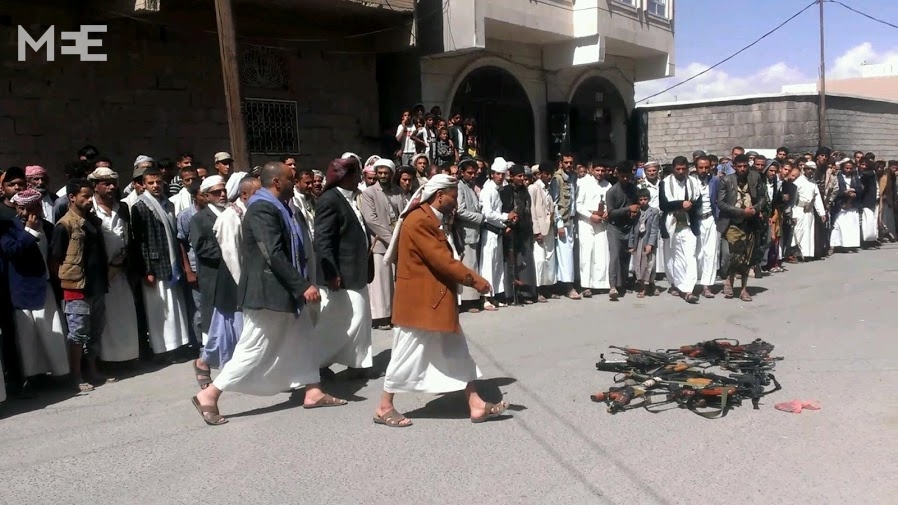Traditional tribal justice trumps state laws for many in Yemen

When Hasan Ali, 41, a tribesman from Khawlan in the Sanaa governorate, got into a land dispute with a neighbour, he tried to take the matter to the courts. He says he spent five years in court and about $7,000 on expenses before finally giving up and turning instead to tribal mediation which finally ultimately settle the issue.
As the Yemeni state has grown weaker and rampant corruption and institutional inadequacies have been left unchecked, a growing number of Yemenis – particularly those in northern and eastern areas of the country where the state is the weakest – have opted to ditch the state legal system in favour of more traditional methods of conflict-resolution.
The social customs or tribal norms in Yemen are precise and comprehensive, with rules for almost all potential issues or disputes, and tribal elders say they are catering for people’s needs well.
Sheikh Zaid Bin Ali al-Jamrah, 43, the tribal sheikh of Bani Husheish to the northwest of Sanaa city, says the tribal way is easier, fairer and more efficient.
“The social norms are faster and quicker to solve disputes than the procedures adopted by the state’s institutions, like going to police stations, then prosecution departments, the courts, as well as the expenses that the claimants spend,” Sheikh al-Jamrah told Middle East Eye.
Traditional methods of conflict resolution
Hamoud al-Awodi, professor of sociology at Sanaa University, agrees that tribal norms fit in more closely with local customs than state courts.
"There are two reasons for that: first, the social norms which inform tribal justice are considered to be the rules which organise people’s affairs,” al-Awodi told MEE. “The second reason is that if the state’s law does not express people’s needs and interests, it won’t be accepted by people, and unfortunately when the state’s law is corrupted and violated by personal interests, people won’t be able to obtain their rights via the official law or official judiciary.”
According to Awodi, the two systems can be made to work side-by-side instead of undermining one another, although he still believes that as the state system has been derived from tribal traditions, the latter can be more effective.
“They [social norms] can work in parallel with the state’s laws without contradicting with its laws, as the social norms are considered to be an independent system that helps the state solve many issues,” Awodi said.
“Social norms are the origin, and the state’s laws are merely derived from the social customs and norms that people recognise in all communities,” he added, while stressing that state laws are merely an improvement on pre-existing norms and customs.
The protection of women
Supporters of the tribal system argue that it continues to be relevant in this day and age and has become even more necessary following the escalation in hostilities in Yemen which have seen the country divided and foreign powers vie for influence.
Under tribal laws, for instance, one is forbidden from shooting his opponent if he is in a public market, or driving, or walking with a woman.
“It is a seen as shameful to shoot or fight your opponent in a public market or if he has a child or woman with him,” said Sheikh Mohsen al-Nini, 48, the tribal leader of Bani Seham tribe in the Sanaa governorate.
Jamrah says the custom is applied in all tribes. “Our tribal justice system honours woman very highly even during times of war - a woman cannot be hurt or assaulted, and if she is hurt or killed, it will be a very big shame and the punishments will be doubled many times and may cost more than the life [of the killer].”
Fatima Ahmed, 56, says that tribal law has previously protected her when the state could not do so. When she asked for a divorce from her husband 25 years ago, because he was beating her badly, her father refused and made her return to her husband by force. With nowhere else to turn, she went to the tribal leader, who told her father to write a pledge not to hurt her again and to find a solution and facilitate her divorce.
Om Najeeb, a woman in her 50s, also says that tribal laws helped her get justice.
“After the death of my father, my brothers refused to give me my inheritance and I did not have enough money to go to the courts for years, so I authorised one of the dignitaries in our village to take my inheritance from them,” Om Najeeb said, while confirming that her representative took her brothers to a tribal leader who gave a tribal-norms-based decision to hand over her fortune.
However, many people, whether they themselves belong to a tribe or not, think that social norms in fact violate women’s rights, especially those who live in rural areas.
Rashad al-Nehmi, 34, a tribesman working as a teacher said, “though many of our social norms support women, we find that they can also violate many of their rights. For example, if a man killed a woman deliberately, he won’t be killed... according to our norms, though we know that the financial fines are very high.”
Also, according to Yemeni social norms, if a woman commits an offence, she receives half of the punishment that a man would receive for the same offence. According to Nada Ismail, a 23-year-old university student at Sanaa University: "This is not because such norms respect women; it is instead because they belittle the women’s ability to judge the volume of offences and think that women should not be equal to men, even in punishments.”
Tribal arbitration
One of the most prominent forms of tribal arbitration is known as tahkeem, which is considered to be the tribal equivalent of a judicial system.
Under the customs, when two parties have a dispute, they select a tribal leader or a sub-tribal leader, who acts as a judge and reviews their grievances.
The authorised tribal leader usually asks for adal or hakam, (compensation and justice) which can be in the forms of guns, money, cars, or expensive daggers, as a guarantee that the two disputing parties won’t commit further offences and will implement the decision taken by their appointed tribal leader.
The two parties then present a clear and agreed-upon account of the case and their allegations. This is done so that “the two disputing parties do not present any allegations or reaction outside of the lawsuit, and the tribal leader himself does not have the right to issue any verdicts unrelated to the lawsuit,” Jamrah said.
According to Aowdi: “The social norms are based on democracy and choice where you have the right to choose the judge and to accept or refuse the verdict - in contrast to the state’s laws and courts where one cannot select the judge. This is an advantage that attracts people to the social norms.”
If one side does not abide by the ruling, the leader sells the adal to try to compensate the aggrieved party and punish anyone who has rejected the ruling.
Tiers of justice
Ali Nasser, 35, says he took his case to a tribal elder after he had a dispute with a distant relative over $3,000. When his relative refused to approve the initial ruling, the case went to another tribal leader, called al-manha.
“My relative thought that the decision of the first-grade tribal leader was unjust, so he decided to go to the second-grade tribal leader who gave a different decision from the first one, and we both accepted it,” said Nasser.
If they had not agreed again, the case could have gone to the uppermost tribal leader known as the faraa aala, which is equivalent to the supreme court.
Much like the state’s judicial system, tahkeem has three judicial grades. Moreover, the verdicts or decisions issued by tribal leaders are approved by the state’s judicial system, and are equivalent to the state’s first-grade court.
Also, if the disputing parties, or even just one of them, refuses the verdict of the tribal leader and wants to go to court, they can opt to go to the second-grade state appeal court, which should help expedite the decision-making process.
Crime and punishment
Another type of tribal arbitration occurs if someone commits an offence and wants to apologise. To do this, the guilty party must come to the offended party and brings the hakam (the payment of money or goods) and writes the authorisation document, the tahkeem.
The offended party usually acts as a judge and issues their verdict. The verdict must not violate the common-known tribal norms; otherwise the second party has the right either to take the first party to another tribal leader as an appeal judge, or to go to the appeal court.
“The offended party is now the judge but at the same time he must respect the social or tribal customs and his decision must not violate them otherwise his decision won’t be accepted or implemented by the second party, [who can] to go to another tribal leader or to the appeal court to try to reverse and amend the decision,” said Sheikh Nini.
The type of punishment allowed depends on the type of offence committed as well as who the defendant is. For instance, if a tribal leader is attacked or he attacked someone, the punishment for him or against him will be four times higher than for a normal member of the tribe.
Many people in Yemen are seemingly depending on more traditional methods of criminal justice than ever before in light of the absence of a stable state’s security apparatus and a lack of reliable judicial authorities.
Hussein al-Hamdani, 48, a state administrative employee, believes that tribal justice is more effective nowadays because disputes are solved faster.
The low cost is another major appeal of the traditional system. Najeeb Abdulkareem, 42, a local farmer, says: “I am in favour of tribal justice because now, with the economic situation in Yemen so bad, going to state authorities means paying out millions till you get your rights - and that's if you're lucky enough to get them eventually!”
New MEE newsletter: Jerusalem Dispatch
Sign up to get the latest insights and analysis on Israel-Palestine, alongside Turkey Unpacked and other MEE newsletters
Middle East Eye delivers independent and unrivalled coverage and analysis of the Middle East, North Africa and beyond. To learn more about republishing this content and the associated fees, please fill out this form. More about MEE can be found here.





